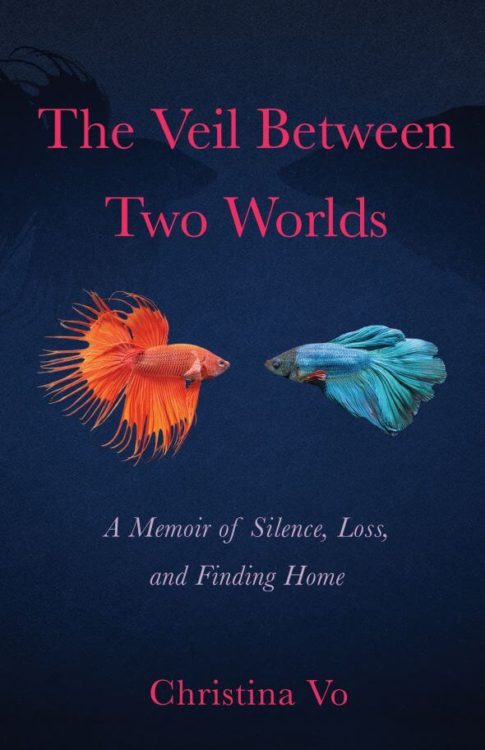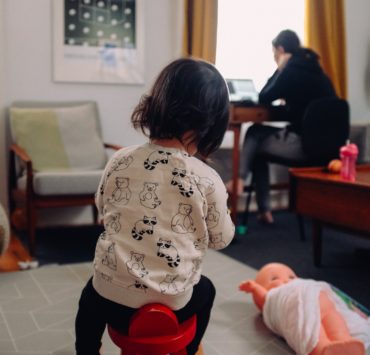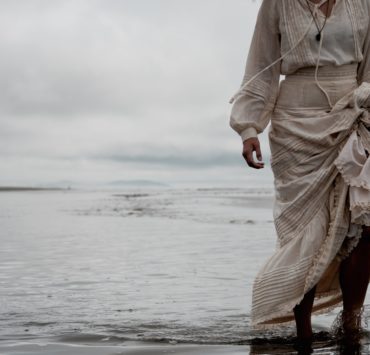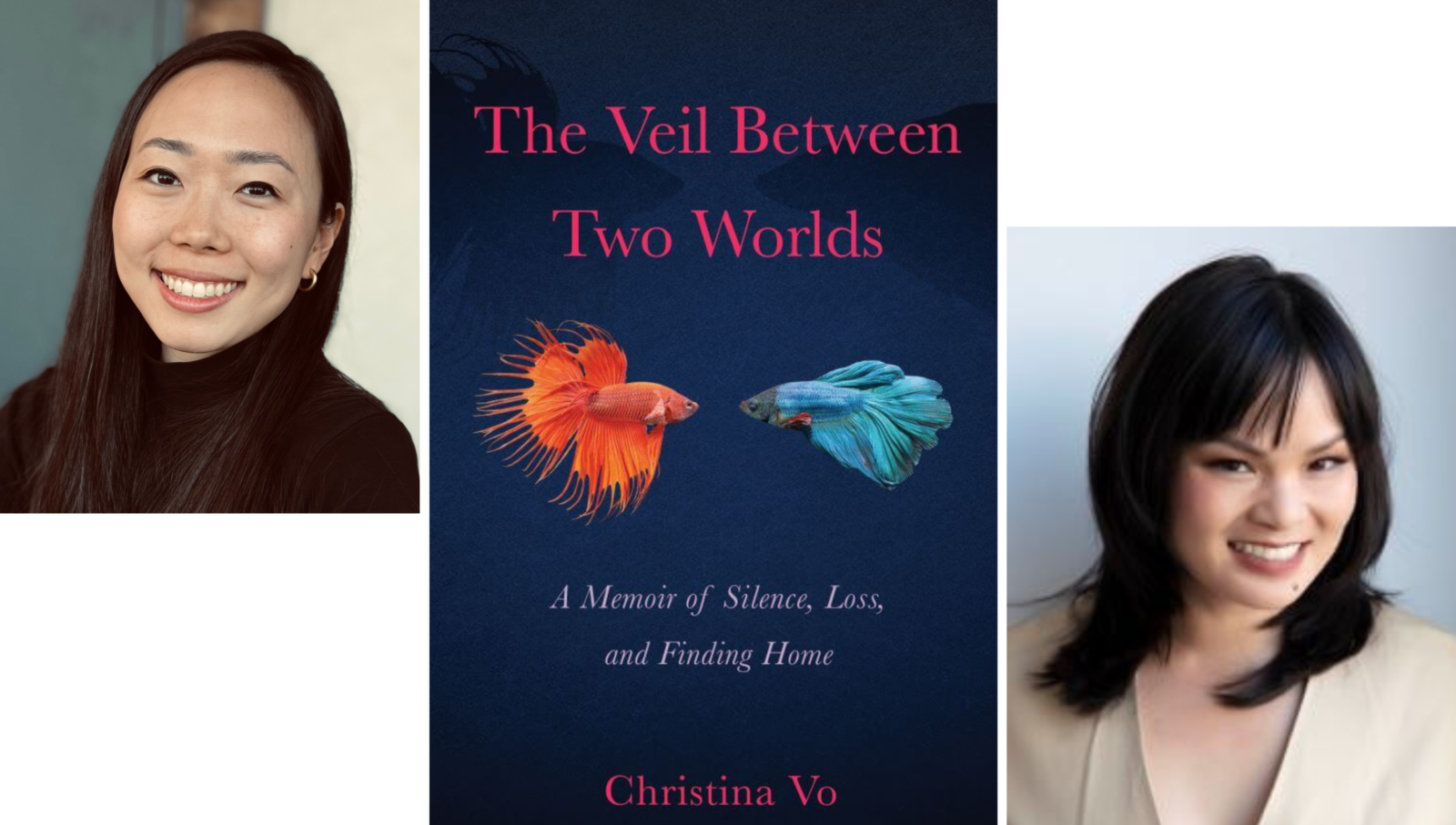
For children of immigrants, it is often difficult to decouple our family experiences with the American nuclear families that we see around us. As a teenager, I studied at hagwon while my American friends went on weekend hikes with their families. Their trips felt full of familial bonding and well-being; my weekends were more isolated as my parents encouraged me to focus on academics because that was what they were familiar with in Korea, and they saw it as a way for me to succeed in a country that was new to them. As I’ve gotten older, I see how the disconnects can continue with pressures of children, friendships, and relationships. Christina Vo begins her new memoir just before her 40th birthday, single and childless. She asks questions that resonated with me, wondering where she will find “that deeper sense of connection and belonging if not from a family unit?”
Vo’s heartbreaking and incisive memoir, The Veil Between Two Worlds, explores how the path towards healing and self-love is never direct.
Ever since her mother passed away when she was a teenager, Vo craved maternal love and nurturing, especially as her relationships with her father and sister were distant. Her 40th birthday holds self- and society-imposed pressures. At this crux in her life, Vo embarks on a spiritual journey with her close friend David—from Santa Barbara, to Ojai, and finally Santa Fe—to seek meaningful connections with the people in her life, and ultimately with herself.
Vo’s journey is full of ceremonies. The first one occurs at an ayahuasca ceremony in Santa Barbara. She attends with David, who she refers to as her soul friend because of the similar paths their lives have taken. Ayahuasca ceremonies originate from the indigenous of the Peruvian Amazon, where communities refer to the natural hallucinogenic plant ayahuasca as Abuela, which provides healing. After Vo ingests the ayahuasca, the ceremony guide tells her that she suffers from the “mother wound.” Though she balks against this at first, Vo is encouraged to pray, after which she feels enveloped by a powerful, female energy. Though she thought she had processed her mother’s death, the “mother wound” is deeply present within her.
What makes Vo’s memoir so compelling is the incredible amount of agency she has, constantly seeking and inviting concrete ways of processing her grief.
Another important ceremony is the Đám Giỗ, or Vietnamese death anniversary, that Vo holds for her mother. In the Đám Giỗ, the Vietnamese celebrate their deceased family members, whose spirits they believe may still be wandering the earth. In this two-day event, the dead are invited back to the living realm with the lighting of incense at the altar. Vo invites her friends to her apartment in San Francisco and shares stories about her mother.
While a death anniversary is often seen as a sorrowful event in American culture, I loved how the Đám Giỗ re-envisions it as a hopeful community event. This ceremony is what inspires the title of the book, from Vo realizing that the “thin veil between the earthly and spiritual realm could drop away with a simple invitation.” The story also moves between her physical journey and her spiritual one. This narrative structure mirrors the titular veil; though there is an implied separation, it’s one that is sheer and removable.
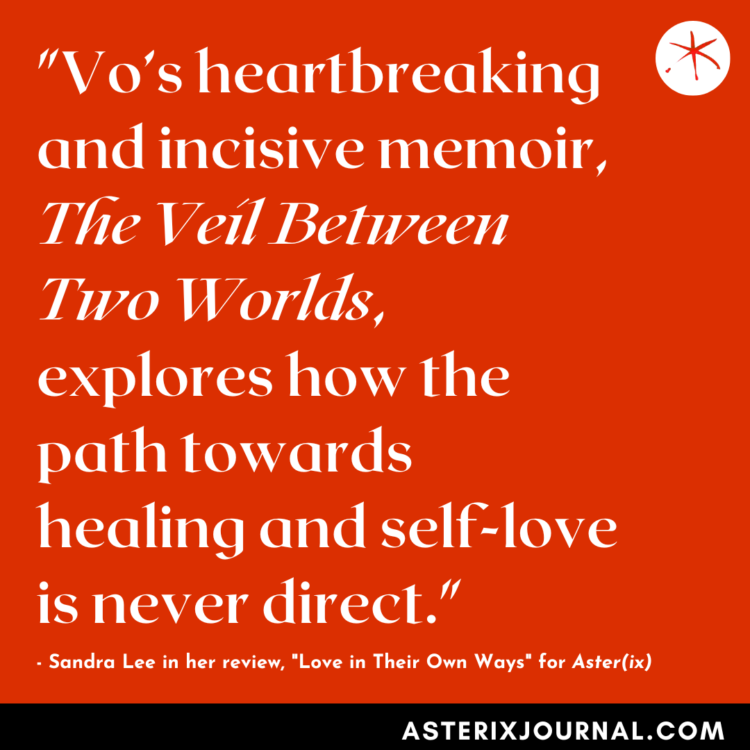
One of the most heartbreaking sections of the memoir is when Vo’s sister Teresa is in a medically induced coma after overdosing on drugs. After their mother died, the sisters numbed their pain in different ways: Vo by seeking intimate relationships with men, and Teresa by using drugs. When Teresa wakes up, she tells Vo that she needs her. At this point, Vo realizes that they would have been closer if they admitted needing each other from the start. Though Vo has always lamented the lack of deep connection in her family, she realizes that she too has played a big part in creating the distance between them.
The moments in The Veil that really shine are when Vo takes a critical eye to herself and starts recognizing patterns. For instance, she resents her father for his inability to love her the way she needed him to love her—to play both roles of father and mother. But as she reflects on what one of her ayahuasca mentors refers to as “sacred mirrors,” she realizes she sees his distant tendencies in herself. Only then is she able to recognize how he has overcome his own traumas from having fled from Vietnam to the US, and has shown his love to her in his own ways. Sending her money to come visit him, buying her different foods when she was home; these were signs of his love language that she would have taken for granted before her spiritual journey.
When I was first introduced to this memoir, I immediately thought of Eat, Pray, Love where the narrator goes on a spiritual search across countries, and finds peace when she is able to accept romantic love into her life again. No hate at all on that narrative, and I often enjoy such stories, but there was something so special in the fact that the connections that Vo cherishes at the end of the journey are the ones she began with, deepened in a meaningful way. In The Veil, the spiritual journey is focused on the self, and reading it felt like a second-hand therapy session. Only once Vo confronts her past, through a patient look inward, is she able to start reconciling with her present to achieve the peace that she seeks. In Vo’s words, “for many of us, the purpose of life is to be on a journey of self-love, and then to see how that love of self allows us to love others in a deeper way.”
As a fellow Asian American woman who has also lived a transient adult life, and also started therapy regularly for the first time, this memoir mirrored many of the internal journeys that I, too, have been working on to unpack family relationships and seek spirituality (through Christian faith in my case). It’s only as an adult that I’ve been able to appreciate my parents’ sacrifices and the ways that they, too, have shown me love in their own ways. My mom will spend days gathering and preparing different foods for when I come home to visit, or my dad will drive an extra hour out of his way to deliver me pine nut porridge when I am sick.
The Veil makes me reflect further on all the ways that I am grateful to my parents, and how when you’re seeking deeper connections, you can always start with the relationships that have been there all along.
The Veil between Two Worlds: A Memoir of Silence, Loss, and Finding Home is by Vietnamese-American writer Christina Vo, out today from She Writes Press.

Sandra Lee is an MFA candidate in Fiction at the University of Pittsburgh. She is working on an interlinked short story collection about members of a Korean American church in Queens.






